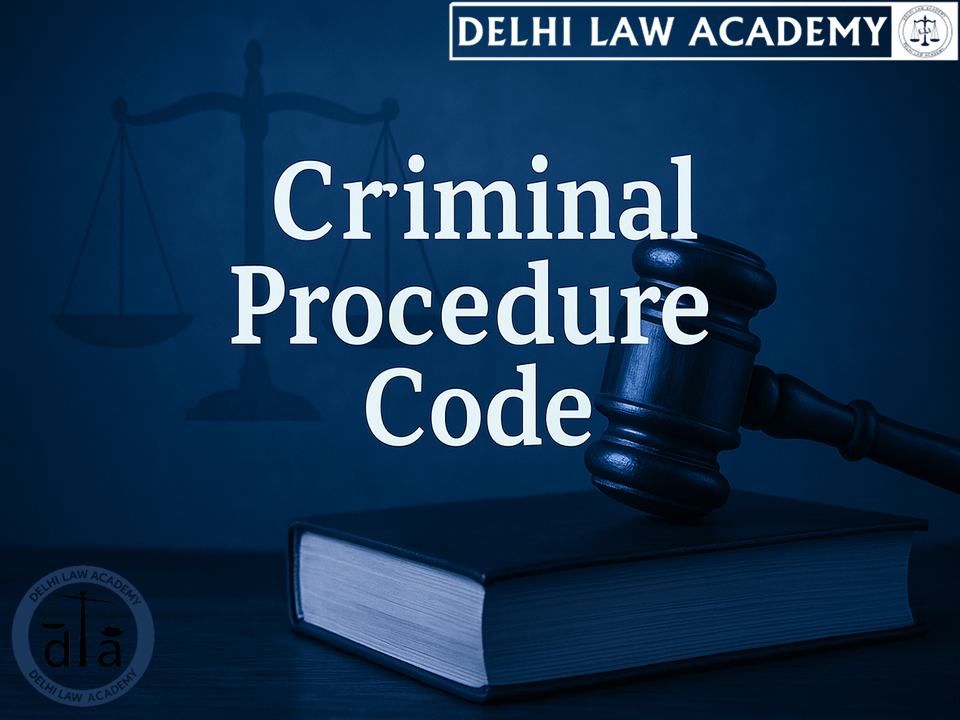
⚖️ CRIMINAL PROCEDURE CODE: THE LAW OF ANTICIPATORY BAIL
Preparation for RJS, DJS, PCS (J) and other Judicial Service exams
Supreme Court in Gurbaksh Singh Sibbia v. State of Punjab [1980]
- 🟢 A person seeking anticipatory bail is still a free man entitled to presumption of innocence.
📘 CRIMINAL PROCEDURE CODE EXPLAINED
The Criminal Procedure Code forms the bedrock of any and every Judicial Service exam in the country. Its thorough knowledge is a must for all aspirants of RJS, DJS, PCS (J) and every other Judicial Service exam. To help such aspirants, DELHI LAW ACADEMY JAIPUR has launched a series of study material modules on all important aspects of this vital part of their syllabus:
⚖️ THE LAW OF ANTICIPATORY BAIL
🧾 Ordinary bail v. Anticipatory bail
- The distinction between an ordinary order of bail and an order of anticipatory bail is that whereas the former is granted after arrest and therefore means release from the custody of the police, the latter is granted in anticipation of arrest and is therefore effective at the very moment of arrest.
🕊️ It is a pre-arrest legal process
- Unlike a post-arrest order of bail, it is a pre-arrest legal process which directs that if the person in whose favour it is issued is thereafter arrested on the accusation in respect of which the direction is issued, he shall be released on bail.
- It has to be borne in mind that anticipatory bail is sought when there is a mere apprehension of arrest on the accusation that the applicant has committed a non-bailable offence.
- A person who has yet to lose his freedom by being arrested asks for freedom in the event of arrest. That is the stage at which it is imperative to protect his freedom, insofar as one may, and to give full play to the presumption that he is innocent.
- Section 438 confers on the High Court and the Court of Session the power to grant anticipatory bail. We see no warrant for reading into this provision the conditions subject to which bail can be granted under Section 437(1).
- That section, while conferring the power to grant bail in cases of non-bailable offences, provides by way of an exception that a person accused or suspected of the commission of a non-bailable offence “shall not be so released” if there appear to be reasonable grounds for believing that he has been guilty of an offence punishable with death or imprisonment for life.
- If it was intended that the exception contained in Section 437(1) should govern the grant of relief under Section 438(1), nothing would have been easier for the legislature than to introduce into the latter section a similar provision.
- In cases falling u/s 437, there is some concrete data on the basis of which it is possible to show that there appear to be reasonable grounds for believing that the applicant has been guilty of an offence punishable with death or imprisonment for life.
- In case falling u/s 438 that stage is still to arrive and, in the generality of cases thereunder, it would be premature and indeed difficult to predicate that there are or are not reasonable grounds for so believing.
- The foundation of the belief spoken of in Section 437(1), by reason of which the court cannot release there applicant on bail is, normally the credibility of the allegations contained in the first information report. In the majority of cases falling u/s 438, that data will be lacking for forming the requisite belief.
- While granting relief u/s 438(1), appropriate conditions can be imposed u/s 438(2) so as to ensure an uninterrupted investigation. One of such conditions can even be that in the event of the police making out a case of a likely discovery u/s 27 of Evidence Act, the person released on bail shall be liable to be taken in police custody for facilitating the discovery.
- Since denial of bail amounts to deprivation of personal liberty, the court should lean against the imposition of unnecessary restrictions on the scope of Section 438, especially when no such restrictions have been imposed by the legislature in the terms of that section.
- If the proposed accusation appears to stem from some ulterior motive, the object being to injure and humiliate the applicant by having him arrested, a direction for the release of the applicant on bail in the event of his arrest would generally be made.
⚖️ Factors to Consider
- Nature and seriousness of the proposed charges
- Context of the events likely to lead to the making of the charges
- A reasonable possibility of the applicant’s presence not being secured at the trial
- A reasonable apprehension that witnesses will be tampered with
- It is of paramount consideration to remember that freedom of individual is as necessary for the survival of society as it is for the egoistic purpose of the individual.
- A person seeking anticipatory bail is still a free man entitled to presumption of innocence.
- Section 438(1) of the Code lays down a condition, which has to be satisfied before anticipatory bail can be granted.
- The applicant must show that he has “reason to believe” that he may be arrested for a non-bailable offence.
- The use of the expression “reason to believe” shows that the belief that the applicant may be so arrested must be founded on reasonable grounds.
- Mere ‘fear’ is not ‘belief’, for which reason it is not enough for the applicant to show that he has some sort of a vague apprehension that someone is going to make an accusation against him, in pursuance of which he may be arrested.
- Grounds on which belief of applicant is based that he may be arrested for a non-bailable offence, must be capable of being examined by the court objectively, as it is then alone that court can determine whether applicant has reason to believe that he may be so arrested.
- Filing of a first information report is not a condition precedent to the exercise of the power u/s 438.
- The imminence of a likely arrest founded on a reasonable belief can be shown to exist even if an FIR is not yet filed.
- Anticipatory bail can be granted even after an FIR is filed, so long as the applicant has not been arrested.
🚫 No Blanket Order
- A ‘blanket order’ of anticipatory bail should not generally be passed.
- The section requires the applicant to show that he has “reason to believe” that he may be arrested.
- A belief can be said to be founded on reasonable grounds only if there is something tangible to go by on the basis of which it can be said that the applicant’s apprehension that he may be arrested is genuine.
- Specific events and facts must be disclosed by the applicant in order to enable the court to judge of the reasonableness of his belief, the existence of which is the sine qua non of the exercise of power conferred by the section.
📚 Gurbaksh Singh Sibbia v. State of Punjab 1980 SC
- Gurbaksh Singh Sibbia, was a Minister of Irrigation and Power in Punjab. Grave allegations of political corruption were made against him whereupon applications were filed in the High Court u/s 438, praying that the appellants be directed to be released on bail, in the event of their arrest on the aforesaid charges.
- A Full Bench dismissed them.
- This case involves a question of great public importance bearing, at once, on personal liberty and the investigational powers of the police. The society has a vital stake in both of these interests. Our task in these appeals is how best to balance these interests.
- High Court order was set aside.
💬 Frequently Asked Questions on Anticipatory Bail under CrPC
- Nature and seriousness of the offence
- Applicant’s likelihood of attending trial
- Possibility of tampering with evidence or witnesses
- Motives behind the accusation (e.g., malice or political vendetta)
The goal is to balance individual liberty with societal interest in investigation.
📘 For detailed notes and case summaries on CrPC and Anticipatory Bail, visit
Delhi Law Academy
📘 Free Study Material for Judiciary Aspirants!
Download our FREE study material prepared by Delhi Law Academy’s expert faculty.
Contact us
📍 Delhi Law Academy – Jaipur Branch
6C, Tower 2, Coaching Hub, Pratap Nagar, Jaipur – 302033
📞 Phone:
+91 9911916552
+91 8447285606
✉️ Email:
contactus@delhilawacademy.com

